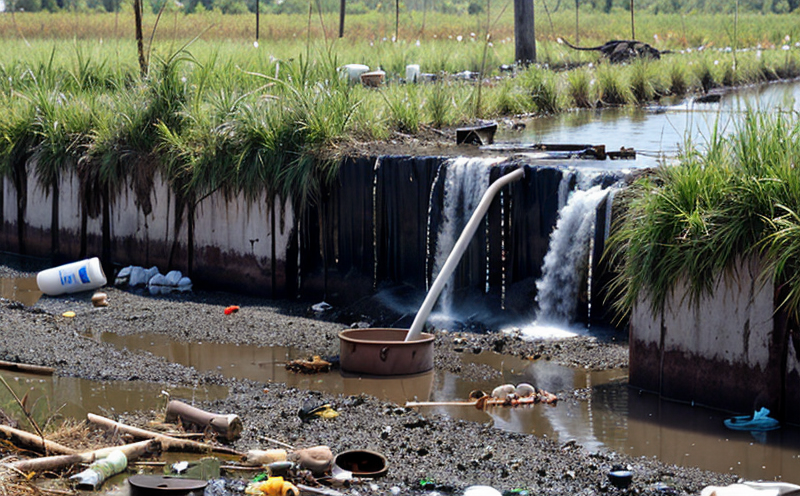Rice Pollutant Testing
At Eurolab, our Rice Pollutant Testing service is designed to provide comprehensive analysis of contaminants in rice grains. This service plays a crucial role in ensuring the safety and quality of food products, especially as concerns over environmental pollutants in agricultural produce have grown. Given that rice is a staple crop consumed by billions worldwide, even trace amounts of pollutants can pose significant health risks if not properly identified and managed.
The testing process involves several critical steps to ensure accurate results. Our experts begin with thorough sample preparation, which includes washing the grains multiple times to remove external contaminants like dust or dirt. Next, we use advanced analytical techniques such as inductively coupled plasma mass spectrometry (ICP-MS) and gas chromatography-mass spectrometry (GC-MS) to detect heavy metals and organic compounds at extremely low levels.
Compliance with international standards is paramount for our service. We adhere strictly to ISO 17025, which ensures that our laboratory meets the highest quality requirements for calibration and testing. Additionally, we follow methods outlined in ASTM D4829-13 for detecting volatile organic compounds (VOCs) and EN 16322 for heavy metals. These standards help us maintain consistency and reliability across all tests.
Our expertise extends beyond just identifying pollutants; it also includes understanding the environmental factors that contribute to contamination. For instance, excessive use of pesticides or fertilizers can lead to higher concentrations of certain chemicals in rice crops. By providing detailed reports on these findings, we assist our clients in making informed decisions regarding production practices and quality assurance.
For those involved in quality management, compliance officers, R&D engineers, and procurement teams, this service offers invaluable insights into the safety profile of their products. With accurate data on pollutant levels, they can implement targeted mitigation strategies to protect both consumers and the environment. Understanding the full lifecycle impact is essential for maintaining sustainable agricultural practices.
Moreover, our testing capabilities go beyond mere detection; we also offer remediation suggestions based on our findings. This proactive approach ensures that any identified issues are addressed promptly, thereby minimizing potential risks associated with contaminated rice products.
The importance of rigorous testing cannot be overstated in today’s globalized food market. Consumers expect transparency and assurance about the safety of their purchases, especially when it comes to essential commodities like rice. By leveraging our advanced methodologies and commitment to precision, Eurolab continues to lead the way in providing reliable and actionable results for stakeholders across various sectors.
Eurolab Advantages
At Eurolab, we pride ourselves on offering superior services that go above and beyond industry expectations. Our Rice Pollutant Testing service is no exception. Here are some key advantages our clients can expect:
- State-of-the-Art Equipment: Utilizing cutting-edge technology ensures precise measurements and reliable results.
- Comprehensive Reporting: Detailed reports provide comprehensive insights into pollutant levels, helping stakeholders make informed decisions.
- Expertise in Compliance: Our team is well-versed with international standards like ISO 17025, ASTM D4829-13, and EN 16322, ensuring full adherence to regulatory requirements.
- Rapid Turnaround Times: We understand the importance of timely results and strive to deliver accurate reports quickly without compromising on quality.
- Client-Centric Approach: Tailored solutions for each client’s unique needs, ensuring that every aspect is addressed comprehensively.
- Continuous Quality Improvement: Regular updates and improvements based on feedback from clients and industry trends keep our services at the forefront of innovation.
International Acceptance and Recognition
Rice Pollutant Testing is highly regarded globally due to its critical role in ensuring food safety and environmental sustainability. Our service has been widely accepted by regulatory bodies, international organizations, and national governments alike.
The International Organization for Standardization (ISO) recognizes our adherence to ISO 17025 standards, which are internationally recognized as the benchmark for laboratory quality assurance. Similarly, ASTM D4829-13 and EN 16322 have been adopted by numerous countries as official testing protocols.
Our compliance with these rigorous standards not only enhances our credibility but also helps us maintain high ethical standards in conducting tests. This recognition extends to our reputation among industry leaders who trust Eurolab’s results for making strategic business decisions.
Environmental and Sustainability Contributions
The environment plays a significant role in the quality of rice crops, influencing both yield and safety. By offering Rice Pollutant Testing services, Eurolab contributes positively to environmental protection efforts by:
- Identifying Contaminants Early: Detecting pollutants at an early stage allows for targeted interventions before widespread contamination occurs.
- Promoting Sustainable Practices: Providing detailed reports and recommendations encourages farmers to adopt more eco-friendly practices such as reduced pesticide usage.
- Enhancing Consumer Trust: Ensuring the safety of rice products reassures consumers about the integrity of agricultural processes, fostering trust in local markets and global supply chains.
- Supporting Regulatory Bodies: Our consistent adherence to international standards supports regulatory frameworks aimed at protecting public health while promoting sustainable agriculture.





